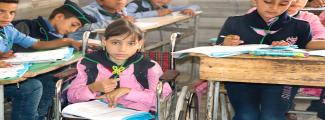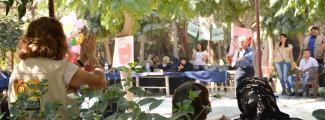I am special, and my disability is not my death sentence!
Sabah is a 12-year-old girl who lives with her mother and five sisters. As for her father, he went missing, which made her mother the sole breadwinner for the family.
Sabah suffered from herniated nucleus pulposus, hydrocephalus, and hemiplegia since she was born, which caused her many difficulties and challenges. Nevertheless, it did not prevent her from going to school and striving for her education.
Sabah’s mother was responsible for dropping Sabah off to school in the morning and taking her back at the end of school hours. The latter posed a heavy burden on her, since her daughter’s school was quite far from their home. On top of all that, Sabah suffered from fatigue due to sunlight exposure for a long period of time.
Fortunately, Sabah got introduced to the Syrian Society for Social Development through the Farah Center in Adra, and joined the Friendship groups. While at the center, her mother learned that SSSD also provided medical assistance.
Consequently, Sabah's case was brought up to the Health and Medical programme manager, who in turn assisted her by providing her with a wheelchair for the children.
The wheelchair changed both Sabah and her mother’s lives, as Sabah didn’t feel tired anymore when going to school, and it reduced the mother’s burden and fatigue. It also helped Sabah move around easily and play some of the games with her friends and sisters. Thus, Sabah became one of the top students at school.
The mother’s joy was overwhelming, as she expressed:" You have brought me comfort, and made my dear daughter extremely happy, since she is now able to play with her friends at school…”


